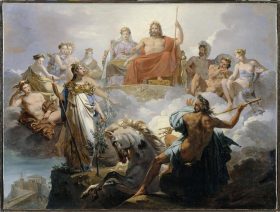One such story comes from Virgil's The Aeneid where the popular cult of Romulus and Remus becomes the founding myth of the city of Rome; telling of the twin's unusual infancy, when they were breastfed and reared by a she-wolf after their parents had deserted them.
Our heroine, Athena was the protagonist of one such founding myth, and she too has a city named after her. And, if you are wondering which city this could possibly be, the clue lies in her name, but it was her name that was given to the city, and not the other way round.
To recall this story we have to start with 'Once, a long, long time ago' because the actual date is not important; only the idea that this all took place in our distant past. Once, a long, long time ago the first king of Athens, King Cecrops (quite an extraordinary king himself, as he was part human and part snake), set out to find a patron deity for his city state; already a prosperous and vibrant city. He called on Athena and Poseidon because both in fact desired to be the patron of this beautiful city. Their rivalry was so intense that they almost went to war and just as they were about to attack each other, Athena, with her typical, wise approach suggested that they should hold a contest for the city. With King Cecrops the judge, they set up the contest and decided that whoever presented the city with the best gift would be rewarded with the city itself as the grand prize
In the midst of a huge crowd, with King Cecrops presiding over the contest, they went up to the Acropolis to present their gifts to the city. Poseidon was to go first, and he lifted his massive trident (three pointed spear) and struck the earth with it. At the point where the spear struck, a frothy spring burst out producing a sea which is now called Erekhtheis. The people loved it but as they went closer to taste the water, to their dismay the water was salty. Don't forget that Poseidon was ruler of the sea, and the water sources he controlled were inevitably salty, just like the seas he ruled.
When it was Athena's turn her act was far less dramatic. She quietly knelt and buried something in the ground which in time grew into an olive tree. This turned out to be a much more useful gift, granting the Athenians not only the olives themselves as sustenance, but also a source of oil for their lamps and for cooking their food as well as the wood from the olive tree to build their boats and houses. Clearly Athena's gift was deemed by far the better by Cecrops, and he declared her the winner and the patron deity of Athens. Athena became the protector of the city (polis) and many people throughout the Greek world worshiped her as Athena Polias (????? ?????? "Athena of the city"). As patron of Athens, she fought in the Trojan War on the side of the Achaeans.
And if you are worried about what happened to the King, you don't have to be concerned, as the fabulous citadel at the Acropolis was named Cecropia after him. The Sea God Poseidon however was not at all pleased by all of this, and in a wild fury he flooded the Thriasian plain, drowning Attika under his salty sea.
The contest for the city of Athens was later carved into the stone relief on the rear pediment in the Temple of Athena on the Acropolis, with both of our heroes appearing in the center of the composition - the goddess holding her olive tree and Poseidon his trident.
This story deserves an additional telling - this time in the Roman tradition…. Here it was the god Neptune who was to challenge the goddess Minerva to the contest over Athens. In this rendering it was Jove (Zeus) who was to judge them. The outcome however was identical, with Minerva winning the contest with her olive tree, establishing what was said to be the first town in the world and naming it in her own name, Athens. In this version not only did Neptune flood the land with a sea of salt but went on to curse the city with a water shortage which still continues today in modern day Greece.





